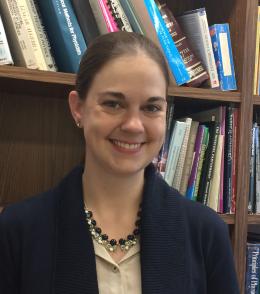This is the unofficial website of the NSF AAPF program, run by the fellows themselves. For official information about the fellowship, please go to the NSF program announcement.
Meredith MacGregor

My research focuses on learning how planetary systems form and evolve through the study of dusty debris disks that are found around young stars. At least 20% of nearby stars are known to be surrounded by debris disks, where large bodies similar to comets or asteroids are ground down through collisions. The resulting dust can be observed via scattered light at visible to near-infrared wavelengths or thermal emission at mid-infrared to millimeter wavelengths, and is directly linked to the larger bodies in the system through collisions and gravitational perturbations. Indeed, planets can imprint observable signatures on extrasolar debris disks as dust is shepherded into long-lived belts and resonant concentrations. Thus, the structure of debris disks offers a unique way to probe for wide-separation exoplanets that might otherwise remain undetectable.
While an NSF fellow, I plan to conduct an in-depth study of debris disks as probes of planetary system evolution by leveraging the multi-wavelength capabilities that the Atacama Large Millimeter Array (ALMA) interferometer and NASA’s James Webb Space Telescope (JWST, to be launched in 2018) will provide. With ALMA, I will perform a comparative study of debris disk structure around nearby stars, allowing me to address the basic dynamical processes that control the evolution of debris disks and their interactions with planets. Combining observations from both ALMA and JWST will allow me to examine radial variations in grain composition within disks, identify connections between grain composition and gas content, and search for possible evidence of dynamical evolution.
The Carnegie Academy for Science Education (CASE) has worked to enhance the science, technology, engineering, and mathematics (STEM) education of students in the Washington, D.C. public school system for the last 27 years. To achieve their goals, CASE oversees a range of programs designed to empower and educate both students and teachers, including the Summer Student Teacher Astrobiology Research (STARS) program, a six week summer research experience for high school students and teachers in training. As an NSF fellow, I will develop a new curriculum on 'Life in the Universe' to be taught in the CASE Summer STARS program. The course will combine hands-on activities and interactive visualizations making use of the astronomy visualization tool, WorldWide Telescope (WWT). During the six week course, students will learn how to formulate their own questions about life in the Universe, while also developing skills beneficial to their future careers. The curricular materials will be throughly vetted by students in the program, as well as CASE high school interns and teachers in training. I will make the final curricular materials publicly available and work with the CASE teachers in training to help them incorporate these new materials into their classrooms.